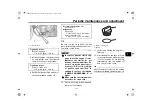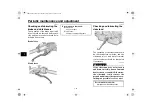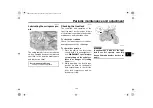
Perio
d
ic maintenance an
d
a
d
justment
7-17
7
wei
g
ht of ri
d
er, passen
g
er, car-
g
o, an
d
accessories approve
d
for this mo
d
el.
WARNING
EWA10512
Never overloa
d
your vehicle. Opera-
tion of an overloa
d
e
d
vehicle coul
d
cause an acci
d
ent.
Tire inspection
The tires must be checked before each
ride. If the tire shows crosswise lines
(minimum tread depth), if the tire has a
nail or glass fragments in it, or if the
sidewall is cracked, have a Yamaha
dealer replace the tire immediately.
WARNING
EWA10472
Have a Yamaha
d
ealer replace
excessively worn tires. Besi
d
es
b
ein
g
ille
g
al, operatin
g
the vehi-
cle with excessively worn tires
d
ecreases ri
d
in
g
sta
b
ility an
d
can lea
d
to loss of control.
The replacement of all wheel
an
d
b
rake-relate
d
parts, inclu
d
-
in
g
the tires, shoul
d
b
e left to a
Yamaha
d
ealer, who has the
necessary professional knowl-
e
dg
e an
d
experience to
d
o so.
Ri
d
e at mo
d
erate spee
d
s after
chan
g
in
g
a tire since the tire
surface must first
b
e “
b
roken
in” for it to
d
evelop its optimal
characteristics.
Tire information
Col
d
tire air pressure:
1 person:
Front:
225 kPa (2.25 kgf/cm², 33 psi)
Rear:
250 kPa (2.50 kgf/cm², 36 psi)
2 persons:
Front:
225 kPa (2.25 kgf/cm², 33 psi)
Rear:
250 kPa (2.50 kgf/cm², 36 psi)
Maximum loa
d
:
Vehicle:
171 kg (377 lb)
The vehicle’s maximum load is the
combined weight of the rider, pas-
senger, cargo, and any accessories.
1. Tire sidewall
2. Tire wear indicator
3. Tire tread depth
Minimum tire trea
d
d
epth (front an
d
rear):
1.0 mm (0.04 in)
1. Tire air valve
2. Tire air valve core
3. Tire air valve cap with seal
UBATEZE0.book Page 17 Monday, December 14, 2020 1:08 PM
















































